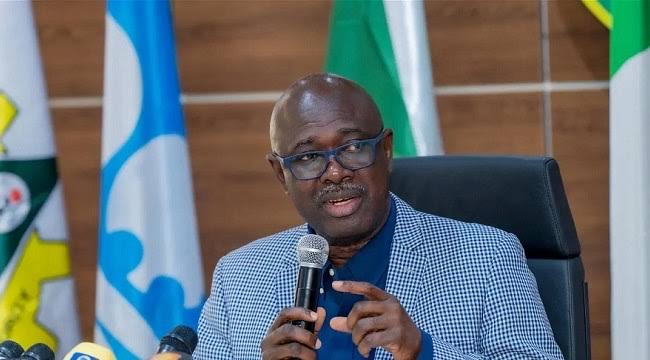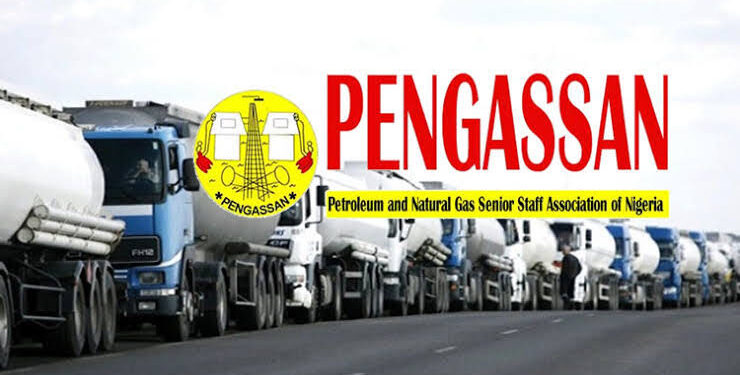The Petroleum and Natural Gas Senior Staff Association of Nigeria (PENGASSAN) has shed light on the reasons why independent marketers are currently unable to buy petrol directly from the Dangote Refinery, an issue that has raised questions among industry observers and consumers alike.
The association’s president, Festus Osifo, provided an in-depth explanation during a press conference held in Lagos on Tuesday, where he elaborated on the pricing structure and market dynamics at play.
Osifo revealed that the root of the problem lies in a pricing disparity between the rates at which the Nigerian National Petroleum Company Limited (NNPCL) purchases Premium Motor Spirit (PMS), commonly known as petrol, and the prices at which it is sold to independent marketers. According to him, NNPCL is able to purchase PMS at an estimated cost of around N950 per liter.

However, the state-owned corporation then sells it to independent marketers at a lower price, approximately N700 per liter, resulting in a significant shortfall that NNPCL must manage. This gap between the buying and selling price creates a complex market environment, where independent marketers are incentivized to continue sourcing their supply from NNPCL, as it offers them a more favorable price point compared to what they would receive directly from the Dangote Refinery.
Expanding on the financial implications, Osifo explained that major marketers who might consider buying directly from the Dangote Refinery would face a different set of challenges. He pointed out that these marketers would likely be purchasing petrol at a price similar to what NNPCL pays—around N950 per liter.
However, to make a profit and cover operational costs, these marketers would have to sell the petrol at a higher price, potentially exceeding N1,000 per liter. This price increase would make it difficult for major marketers to compete with independent marketers, who are benefiting from NNPCL’s lower selling price of N700 per liter.
“Independent marketers prefer to purchase from NNPCL to take advantage of the lower prices,” Osifo stated, emphasizing the economic rationale behind their choice. The pricing dynamics create a scenario where buying directly from the Dangote Refinery becomes less attractive for independent marketers, who are focused on minimizing costs and maximizing their profit margins.
Additionally, Osifo highlighted another challenge facing the Nigerian petroleum market: the allocation of crude oil for loan repayments. He disclosed that a portion of Nigeria’s crude oil output has been tied to loan agreements, which in turn limits the amount of crude available for refining and domestic consumption.
This arrangement further complicates the local fuel supply situation, as the country grapples with balancing its international obligations and ensuring sufficient fuel supply for its citizens.

Furthermore, Osifo raised concerns about the ongoing divestment by International Oil Companies (IOCs) from Nigeria’s oil and gas sector. He noted that while these divestments could present opportunities for local companies to step in and take over assets, they also carry significant risks.
One of the primary risks is the potential decline in foreign direct investment (FDI), which has been a crucial source of capital and technology for the sector. As IOCs exit, there is a possibility that production levels may drop, which could negatively impact Nigeria’s overall oil output and revenue generation.
“The ongoing trend of divestment by International Oil Companies poses both risks and opportunities for Nigeria, including potential reductions in foreign direct investment and production levels,” Osifo cautioned. He urged stakeholders in the industry to carefully consider the long-term implications of these divestments and to put measures in place to mitigate any potential negative effects on the economy.
Additionally, the issues surrounding independent marketers’ inability to purchase petrol directly from the Dangote Refinery are rooted in a complex web of pricing disparities, market dynamics, and broader industry challenges. The NNPCL’s pricing strategy offers independent marketers a more attractive option, while the Dangote Refinery’s pricing structure makes it difficult for them to compete.
The allocation of crude oil for loan repayments and the divestment of IOCs further complicate the situation, leaving the Nigerian petroleum sector at a critical juncture. PENGASSAN’s insights highlight the need for a coordinated approach to address these challenges and ensure that the industry remains stable and competitive in the face of evolving market conditions.
































